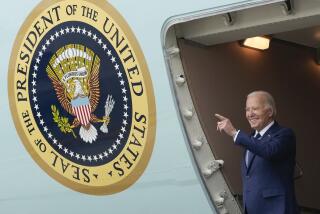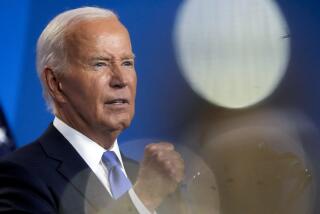Primaries Are Meaningless and Irrelevant for Many
- Share via
Despite the ongoing theater surrounding the primaries, Americans already know -- barring a bombshell -- who the Democratic presidential nominee will be, making 2004 the most truncated primary election cycle in U.S. history.
If you’re Democratic National Committee Chairman Terry McAuliffe -- who has reportedly told all the contenders that if they’re not winning by March 10, they need to drop out of the race -- this is good news. The sooner Democrats agree on a nominee, the sooner they can prepare for the general election. It’s also not troubling if you’re a voter in New Hampshire or Iowa, because you will have helped select the party’s candidate.
But if you’re a voter in California, New York or any of the 10 states that vote in the “Super Tuesday” primaries March 2, it’s a different story. You’re going to have a very limited choice -- many candidates will already have dropped out of the race, and the front-runner will probably have so many delegates and so much momentum that no one can catch up.
And, heaven forbid, if you happen to be a voter in New Jersey or Montana, or any of the nearly two dozen states that hold presidential primaries or caucuses after Super Tuesday, your vote will hardly count at all. Those primaries are, for all intents and purposes, meaningless and irrelevant.
There is a widespread consensus that this system is severely flawed, and several popular reform options have emerged. One calls for a national primary in which all states hold their elections on the same day. Alternatively, some reformers propose a system of regional primaries in which groups of states -- divided by region -- vote sequentially over a longer period. The order of voting would alternate or be selected at random in each election cycle.
The first obstacle to either of these reforms is that all states and parties would need to agree. But there are other considerations. Critics of a single national primary argue, for instance, that it achieves little more than a mandated, front-loaded system that would give an advantage to popular and well-funded candidates. Voters would not have the opportunity to learn about the candidates the way they do now.
That’s where the rotating regional primary system comes in. Political scientists have shown that, under certain conditions, “information effects” are likely in sequential voting schemes; voters learn about candidates and their prospects for victory from early results, and they use this information in later contests. Under this system, states would be grouped into four regions: East, West, South and Midwest. Each region would select delegates through party primaries spaced about a month apart. Iowa and New Hampshire would retain their tradition of kicking off the primary cycle.
This may not be a perfect solution, but it is a reasonable compromise and a dramatic improvement over the current system. If all the states and parties can be persuaded to agree, it could be in place for 2008.
Costas Panagopoulos is executive director of the political campaign management program in the Department of Politics at New York University.
More to Read
Get the L.A. Times Politics newsletter
Deeply reported insights into legislation, politics and policy from Sacramento, Washington and beyond. In your inbox twice per week.
You may occasionally receive promotional content from the Los Angeles Times.










